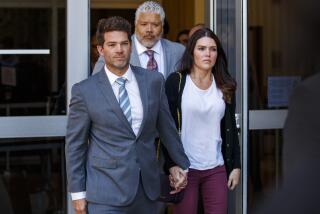Court-martial of Army general on sexual assault charges is put on hold
FT. BRAGG, N.C. — The sexual assault case against Army Brig. Gen. Jeffrey A. Sinclair was suspended indefinitely Tuesday pending new plea negotiations, one day after a military judge’s extraordinary ruling that there was evidence the Army had interfered in previous negotiations.
Army Col. James L. Pohl ruled Monday after new evidence came to light. He gave Sinclair’s lawyers an opportunity to seek a plea agreement even though Sinclair’s previous offer to plead guilty to lesser charges had been rejected.
Military legal experts say both sides have an incentive to reach a deal — the Army to punish Sinclair and to end a compromised case, and the defense to avoid jail time for their client.
Pohl found that the so-called convening authority, Lt. Gen. Joseph Anderson, had been improperly influenced by a letter from the accuser’s advocate, who warned that allowing a plea would undercut the Army’s desire to show that it was getting tough on sex offenders in the ranks.
Sinclair’s accuser, a 34-year-old Army captain, says he twice forced her to perform oral sex and threatened to kill her and her family if she told anyone about their three-year affair.
Sinclair, 51, was the deputy commander of U.S. troops in southern Afghanistan until the captain came forward in 2012. He pleaded guilty to several lesser charges last week — including adultery, inappropriate relationships with two other female officers, impeding an investigation and viewing pornography on duty. That was a tactical move by the defense to avoid salacious accounts of philandering and pornography, and to focus on attacking the accuser’s credibility.
Pohl gave him the opportunity to withdraw that plea.
On Tuesday, the judge told the jury panel of five male two-star generals that he did not know how long the court-martial might be suspended and sent them back to their duty stations.
Sinclair’s lead attorney, Richard L. Scheff, said he expected the delay to last several weeks as the two sides negotiate. “History was made,” he told reporters after the brief hearing.
A new military commander with no previous ties to the case will decide whether to approve a new deal. Under military law, a senior commander — called a convening authority — decides whether to bring sexual assault charges and approves plea deals.
Pohl said Monday there was evidence of “unlawful command influence” by the Army when it rejected Sinclair’s offer last year to plead guilty to adultery and other lesser charges in exchange for dropping sexual assault and other more serious counts. That led to the highly unusual suspension of a court-martial already in progress.
Sinclair, who is married with two children, faces life in prison if convicted of sexual assault, sodomy, communicating a threat, groping the captain against her will, “open and notorious” sex, and abusing his government credit card in pursuit of trysts with the captain.
Scheff said the general would not budge from his assertion that he did not sexually assault or threaten anyone. He declined to say whether Sinclair would insist on no prison time and retirement at a reduced rank.
The negotiations present opportunities for both sides. The Army, embarrassed by its stumbles in the showcase trial, can seek a way out of a problematic case while still punishing Sinclair. The general, his military career in ruins, can attempt to avoid prison.
Ending the case without a return to court would spare the accuser, who broke down in sobs several times while testifying Friday under a prosecutor’s gentle questioning, from what the defense promises would be a bruising cross-examination.
Negotiations “will give the Army some incentive to resolve the case, but ... there is no getting around the fact that this is a politically charged atmosphere,” said Victor M. Hansen, a former Army prosecutor who teaches law at New England Law Boston.
Anita Gorecki, a former Army legal officer who represents military personnel in Washington, said both sides were motivated “to find a deal that both can live with, albeit not with great enthusiasm.”
Plea discussions could be interrupted by the Army’s response to what the defense says is a request for an estimated 10,000 emails from 11 top Army commanders, including Gen. Raymond T. Odierno, the Army chief of staff.
The evidence that disrupted the court-martial included a December letter to Anderson by special victim’s advocate Capt. Cassie L. Fowler. She referred to possible political repercussions if Sinclair’s plea were approved, saying it “would have an adverse effect on my client and the Army’s fight against sexual assault.”
Pohl ruled that the letter probably influenced Anderson to reject Sinclair’s plea.
In a statement, Fowler said the ruling was a response to “an attempt to take the focus off the general’s gross misconduct.”
Other emails revealed that senior Army lawyers had doubts about the accuser’s credibility, and that Anderson’s military legal advisor shared those concerns with the general.
In addition to the sudden halt to the court-martial, the Sinclair case is noteworthy for the emergency telephone testimony Monday from Kabul by Anderson, who commands international forces in Afghanistan. The judge gave prosecutors an hour to make the general available for sworn testimony about his decision to reject Sinclair’s plea.
Anderson testified that he relied on the accuser’s adamant opposition to the plea, rather than the advocate’s letter, in reaching his decision. But the judge said part of Anderson’s testimony “does not seem to make any sense” and was contradicted by Anderson’s own email in December.
In that Dec. 20 email, Anderson wrote: “I have read the letter and made my decision” to reject Sinclair’s plea. Less than three months later, on Saturday night, the surfacing of that email gave Sinclair another chance to reach a plea deal with a different commander.
More to Read
Start your day right
Sign up for Essential California for news, features and recommendations from the L.A. Times and beyond in your inbox six days a week.
You may occasionally receive promotional content from the Los Angeles Times.







